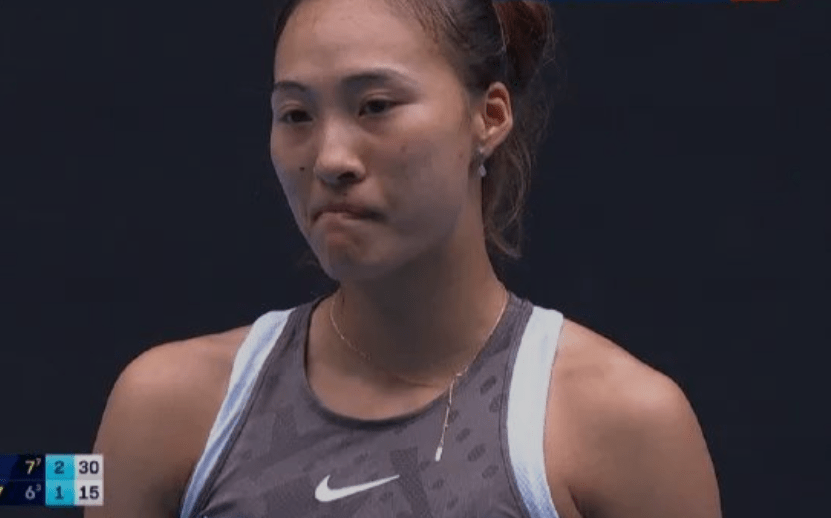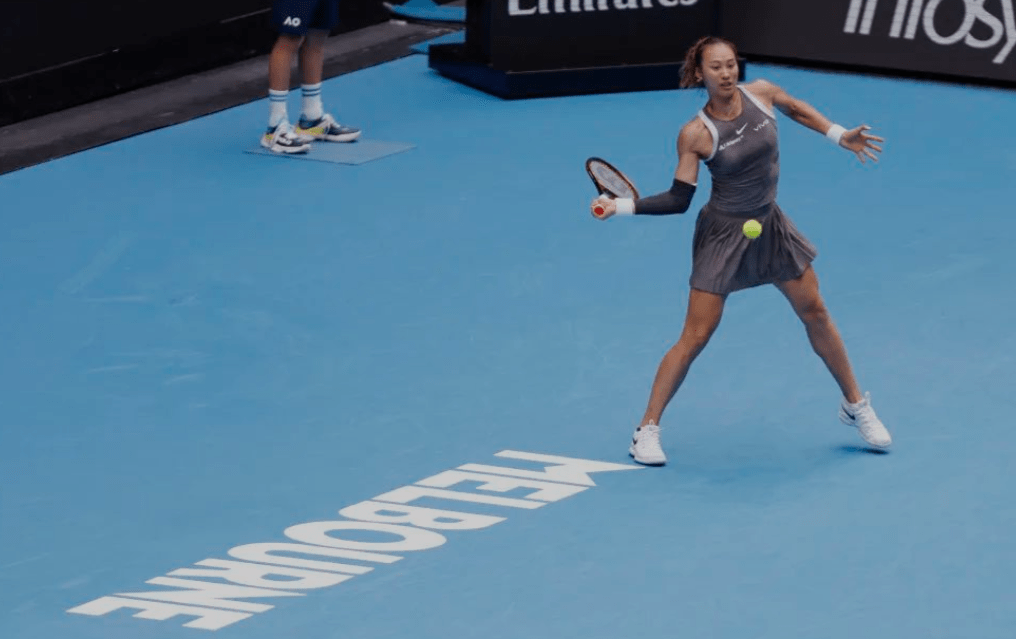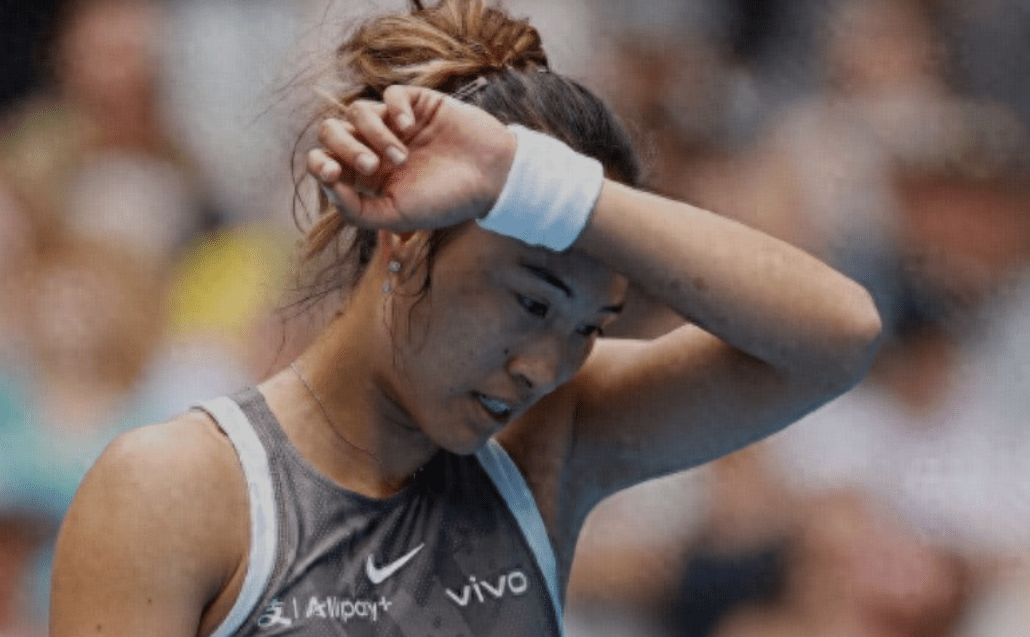Translation of the article content into English:

The camera freezes on the Australian Open court, where Zheng Qinwen stands at the service line, her brows furrowed and a hint of hesitation in her eyes. The referee waves his hand without hesitation to penalize her, coldly uttering "time violation penalty," instantly shattering her concentration. This scene became a turning point in the match, pushing her from the path of victory to the depths of defeat. Have you ever thought that a small decision could so thoroughly determine the direction of a game? Or is this just a concentrated outbreak of a mental crack?

After this match, Zheng Qinwen emotionally collapsed, shedding tears on the court after the game, accusing the referee of making arbitrary decisions. This image makes people both heartbroken and sigh. As a rising star in Chinese tennis, she has turned the tide in countless matches, relying on her tenacity and skills to pave her way. But this time, she couldn't withstand the pressure that came out of nowhere. The question behind this is whether the referee was too harsh or if Zheng Qinwen's psychological endurance wasn't strong enough. Let's go through it step by step.

This isn't the first time Zheng Qinwen has faced controversy. In the 2022 WTA Toronto station competition, her difficult situation once sparked heated discussions— at that time, the referee ruled that her challenge to Hawk-Eye did not comply with the process, a decision that made many spectators hold their breath for her. Being judged "challenge invalid" at a critical moment, the psychological impact on the match is imaginable. However, in that match, Zheng Qinwen did not collapse. She quickly adjusted her state, with more precise serving and aggressive baseline shots, successfully reversing the situation. This performance won applause and also allowed viewers to see her ability to withstand pressure in adversity.

But the Toronto battle and the Australian Open are clearly not on the same level. The atmosphere of the Australian Open, as the grand finale, magnifies any minor mistake. The referee's time violation penalty was obviously the catalyst for her performance that day, but perhaps not the only reason. On such a top-level stage, the stable Zheng Qinwen from Toronto apparently was not prepared to face this wave of psychological impact.

Of course, the outcome of the match should not be attributed solely to a time violation penalty, but by closely examining Zheng Qinwen's performance before and after the penalty, one can discover the subtle connection between psychological state and technical level. In the previous rounds of this match, Zheng Qinwen's serving technique was impeccable: her serving scoring rate was astonishingly high, and her offensive rhythm was perfectly controlled. However, the tension of the match clearly affected her state—before the time violation penalty, her serving error frequency had already begun to rise. The referee's decision undoubtedly shattered her psychological defense at this critical juncture.

This situation is actually not uncommon in the tennis world. At the 2017 US Open, Nadal lost the most important game due to a time violation penalty against Dimitrov. For professional players, serving is the most private aspect of the match and also the part most easily influenced by emotions. Once the rhythm is disrupted, the athlete's technical actions will have a series of chain reactions, making it difficult to quickly return to optimal form. And this may be precisely where Zheng Qinwen's "Achilles' heel" lies.

Another noteworthy point is that Chinese players still have certain adaptation obstacles when facing international referees and rules. Remember Zhang Shuai in the 2021 Wimbledon when the referee controversially ruled her out of bounds; she lost control and argued with the referee on the spot, constantly disputing. But Zhang Shuai ultimately gritted her teeth and persisted to the end, trying to win back the "perceived fairness" in the referee's eyes with her performance. From that match, we can see one of the major psychological difficulties for Chinese players in major international events: when the referee makes an unfavorable decision, cultural and linguistic differences can easily make the player feel isolated and helpless, exacerbating emotional失控.
This invisible psychological barrier is something Zheng Qinwen clearly hasn't been able to escape either. At critical moments, her emotions were too obvious. The desire to win is a double-edged sword on the court; it's motivation when winning, but counterproductive when losing. These experiences reveal problems that are not just technical but also a test of how to reconcile emotions and overcome cultural differences in adversity.
Zheng Qinwen's psychological changes can be glimpsed from her match trajectory. Last year at the French Open against Swiatek, she once fell into a tough battle due to physical exhaustion, but she persisted until the end and was not defeated by the unfavorable situation. At that time, she was like a small boat advancing in a storm, able to maintain basic balance amidst the wind and waves.
However, her failure at the Australian Open makes people feel that she seems to have "regressed." This regression is not technical but appears to be more of a psychological fatigue. Perhaps the pressure of the schedule and external expectations made her psychological "reservoir" unable to bear the burden. Once a catalyst is ignited, the collapse seems irreparable.
Beyond Zheng Qinwen's incident, similar issues have always existed in the tennis world. At the 2018 US Open women's singles final, Serena Williams was penalized by the referee for her coach's illegal guidance, angrily questioning whether the referee was too harsh on female players. This incident exposed the issue of the execution of referee rules: is it more important to strictly adhere to the rules or should the referee take into account the psychology of the players and the atmosphere of the event during execution?
Zheng Qinwen's time violation penalty has also drawn attention to the tug-of-war between referee authority and player emotions. Is there still room for humanity in the match? Judging from the time violation, the rules are fine, but can the referee handle it more flexibly? For example, giving a warning or an opportunity for explanation instead of directly cutting off the player's psychological security. Such topics are likely to be discussed repeatedly in the future.
A single decision, as ordinary as it may seem, has become an unforgettable nightmare for Zheng Qinwen. The result of this match, whether from the objectivity of the referee or the psychological resilience of the player, indeed leaves some areas for reflection. And in the future competitive arena, perhaps every participant needs to learn to better balance the relationship between rules, technology, and humanity. A match lasts only 90 minutes, but the time for growth is infinite.
(Disclaimer) The processes and images described in the article all come from the Internet. This article aims to promote positive social energy and does not contain vulgar or inappropriate content. If there are any copyright or personal infringement issues, please contact us in time, and we will delete the content immediately! If there are any questionable parts of the event, we will delete or make changes immediately after contacting us.